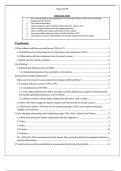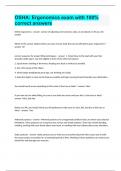Page 1 of 17
CHINA CASE STUDY
The events leading to the establishment of Communist China in 1949 (non-examinable
background information)
The Cultural Revolution
Chinese relations with the USSR and the USA from 1949 to 1973
China’s foreign relations with her neighboring states
China’s world power status by the time of Mao’s death
Improved relations between China and the USA after 1970
The impact of economic liberalization on foreign relations since Mao’s death.
Contents
1 China relations with the ussr and the usa 1949 to 173.............................................................................2
1.1 Establishment of communist china in 1949 and events leading up to 1949......................................2
1.2 What policies did mao implement once he came to power...............................................................2
1.3 What was the cultural revolution......................................................................................................2
Mao Zendong: ............................................................................................................................................3
1.4 Relationship between Mao and USSR................................................................................................3
1.4.1 Relationship between Mao and Stalin vs. Khrushchev................................................................3
The Sino-Sovie relations deteriorate: .........................................................................................................4
What were the reasons for growing tensions between USSR and China ?..............................................5
1.5 relations with the usa from 1949 to 1973..........................................................................................5
1.5.1 Containment: 1949-1969............................................................................................................5
1.5.2 The relationship between Nixon, Kennedy, and Mao Zedong was complex and influenced by
the broader geopolitical dynamics of the Cold War:...........................................................................6
1.5.3 Which countries had the better relationship with China , USA or USSR ?...................................7
1.6 After 1970, China sought to improve relations with the USA due to several reasons:......................7
1.7 Since Mao's death in 1976 and the rise of Deng Xiaoping in 1978, China started making big
changes to its economy:..........................................................................................................................7
2 China changing relationships with neighboring states- Tibet, India, Vietnam, and Taiwan......................8
2.1 What ideas influenced chiana relationships with her neighbors?......................................................8
2.2 Tibet...................................................................................................................................................9
2.3 India...................................................................................................................................................9
2.4 Taiwan.............................................................................................................................................10
2.5 Vietnam...........................................................................................................................................11
2.6 - 1950-1953: China's involvement in the Korean War, supporting North Korea against South Korea
and the United States............................................................................................................................11
3 To what extent was china established as a superpower by the time Mao’s death.................................12
, Page 2 of 17
3.1 What makes a country super power?..............................................................................................12
IEB China case study..................................................................................................................................13
EXERCISE 1: ..............................................................................................................................................13
EXERCISE 2: .............................................................................................................................................13
EXERCISE 3: .............................................................................................................................................13
EXERCISE ANSWERS .................................................................................................................................16
China became involved in the Cold War due to its shift to communism under Mao Zedong's leadership in 1949. The
United States supported the Nationalist government in Taiwan, while China allied with the Soviet Union, leading to
tensions and conflicts in Asia.
1 CHINA RELATIONS WITH THE USSR AND THE USA 1949 TO 173
1.1 ESTABLISHMENT OF COMMUNIST CHINA IN 1949 AND EVENTS LEADING UP TO 1949
Long march was a long journey across china made in 1934 and 1935 by Mao Zendong and his communist army in
order tot reach the new base in northwest china it was a dangerous journey because The marches were often
attacked by their enemies nationalists army ,
1.2 WHAT POLICIES DID MAO IMPLEMENT ONCE HE CAME TO POWER
1. Land Reform: Mao initiated land reforms to redistribute land from wealthy landlords to peasants, aiming
to address rural inequality and garner support from the agrarian population.
2. Collectivization: Mao advocated for the collective ownership of agricultural land, leading to the formation
of communes where peasants worked together on large-scale farms.
3. Five-Year Plans: Inspired by the Soviet model, Mao introduced economic plans aimed at industrializing
China and boosting agricultural production. These plans emphasized heavy industry and infrastructure
development.
4. Great Leap Forward: In 1958, Mao launched the Great Leap Forward, a campaign to rapidly transform
China from an agrarian to an industrial society. This initiative involved the establishment of backyard
furnaces and communes but resulted in widespread famine and economic setbacks.
5. Cultural Revolution: In 1966, Mao launched the Cultural Revolution to reassert his authority and eliminate
perceived bourgeois elements within Chinese society. This movement led to widespread political purges,
social upheaval, and the suppression of dissent.
1.3 WHAT WAS THE CULTURAL REVOLUTION
The Cultural Revolution, initiated by Mao Zedong in 1966, aimed to reassert his authority and purge
perceived bourgeois elements from Chinese society.
Key events included the issuance of Mao's Little Red Book, which contained his quotations and served as a
guide for revolutionary behavior.
Red Guards, primarily composed of students, were mobilized to attack symbols of authority, leading to
"struggle sessions" targeting teachers, intellectuals, and officials.
Schools and universities were closed, and intellectuals were sent to rural areas for "reeducation."
The Cultural Revolution disrupted the education system and the economy, causing widespread chaos and
suffering.
Millions of people were persecuted, imprisoned, or killed, and traditional Chinese culture and values were
attacked and destroyed.
The movement fractured Chinese society, creating deep divisions and mistrust among the population.
, Page 3 of 17
Responses varied, with some enthusiastically embracing Mao's ideology while others resisted or became
victims of persecution.
After Mao's death in 1976, the Chinese government officially denounced the Cultural Revolution as a
grave mistake, leading to reforms aimed at opening up China to the outside world.
MAO ZENDONG:
Mao Zedong played a crucial role in the Cold War, aligning China with the
Soviet Union against the United States.
China sought military aid and support from the USSR due to shared
communist ideologies and mutual enmity toward the West during the Cold
War.
Mao's turn to the USSR resulted in the signing of the Sino-Soviet Treaty in
1950, which included military assistance provisions against common enemies
like Japan and the USA.
Despite cooperation, ideological differences and power struggles emerged
between China and the USSR, leading to tensions and eventual conflict.
Mao's China also engaged in proxy wars, supporting North Korea in the
Korean War and North Vietnam in the Vietnam War against American
influence in the region.
The Sino-Soviet split and the normalization of relations between China and
the USA in the 1970s reshaped the dynamics of the Cold War, with China
becoming a strategic ally of the West against the Soviet Union.
1.4 RELATIONSHIP BETWEEN MAO AND USSR
1.4.1 Relationship between Mao and Stalin vs. Khrushchev
Relationship between Mao and Stalin: Initially, Mao and
Stalin had a strategic alliance based on their shared
communist ideology and the goal of spreading communism.
Stalin provided support to the Chinese Communist Party
(CCP) during the Chinese Civil War against the Nationalists.
However, their relationship was complex, with Stalin
attempting to exert control over the CCP, and Mao seeking
independence and leadership within the communist
movement.
Relationship between Mao and Khrushchev: Mao's relationship with Khrushchev, who succeeded Stalin,
was marked by tensions and disagreements. Khrushchev criticized Stalin's cult of personality and adopted
a policy of peaceful coexistence with the West, which Mao viewed as revisionist and compromising
communist principles. Mao saw Khrushchev's leadership as weak and accused him of deviating from true
Marxism-Leninism. Their ideological differences deepened the rift between China and the USSR, leading to
the Sino-Soviet split.
China’s relations with the Soviet Union shifted from acceptance to contestation of leadership after Stalin’s
death in 1953 and Khrushchev’s rise in 1955.
Reasons for the shift included Khrushchev’s condemnation of Stalin’s cult of personality, his call for
peaceful coexistence with the West, and perceived weaknesses in handling crises like the Cuban Missile
Crisis.
Peaceful coexistence was a foreign policy concept introduced by Soviet leader Nikita Khrushchev during the
Cold War. It referred to the idea that capitalist and communist states could coexist peacefully without
engaging in direct military confrontation.
Khrushchev's proposal for peaceful coexistence suggested that the Soviet Union and the Western capitalist
powers could compete economically, politically, and ideologically without resorting to war. It emphasized





